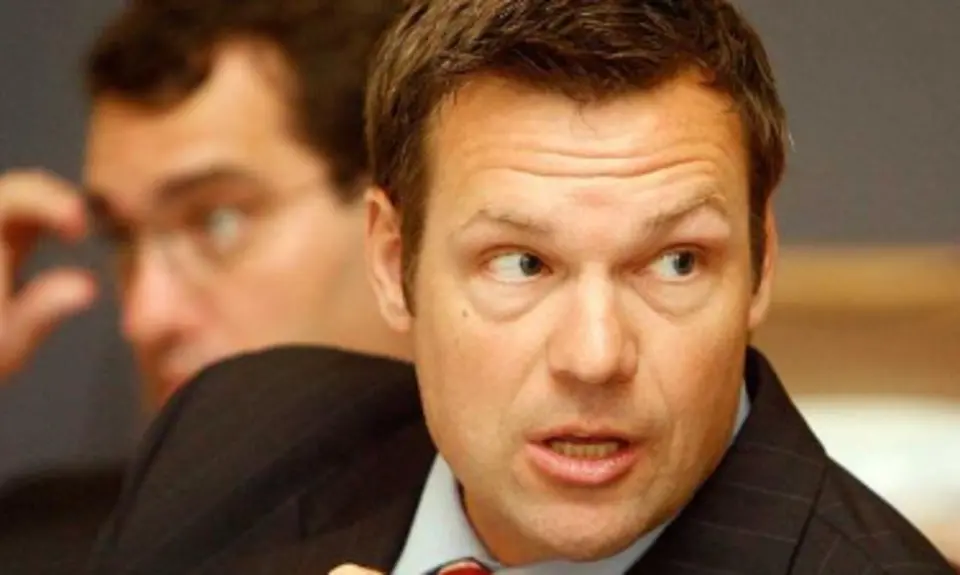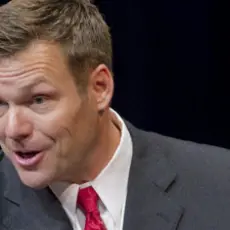Kansas Secretary of State Kris Kobach has been a driver of the Trump administration’s baseless claims that voter fraud is an enormous problem in U.S. elections and that millions of illegal votes for Hillary Clinton cost President Trump the popular vote.
Kobach, who was recently tapped to helped lead a federal panel investigating voter fraud, attempted to crack down on such fraud in Kansas by stiffening registration requirements—a move which cost thousands of Kansans their right to vote—and prosecuting people who commit voter fraud.
If his efforts were meant to prove that voter fraud is a serious problem that must be remedied by enacting restrictions like voter ID laws, then Kobach failed badly, as he has only been able to find just nine possible cases of voter fraud. Eight of the nine voter fraud cases he has prosecuted involved double voting, or Kansans who mistakenly thought they could vote in elections in other states where they also owned property. Voter ID laws, which require that voters show a specific form of photo identification before voting to ensure they aren’t impersonating a different registered voter, would have done nothing to stop double voting.
In a state with over 1.7 million registered voters, Kobach found only one case of a non-citizen who voted, and he was in the process of naturalization at the time and is now a U.S. citizen.
As Politico reported yesterday, most of the people who committed double voting said they were making honest mistakes and simply didn’t know that it was illegal to vote in other states, and “seven of those convicted were registered Republicans and over the age of 60.” Nonetheless, they have been hounded by Kobach, who is bent on proving that voter fraud is a serious problem that requires a strong government response.
Kobach may also use his position on the voter fraud commission to promote Crosscheck, which supposedly identifies people registered in more than one state but is riddled with problems. For example, Crosscheck may wrongly flag two voters who share the same name and date of birth, which could lead to many eligible voters getting thrown off the voter rolls.
Finding a tiny handful of cases of double voting, of course, does not prove that in-person voter impersonation, which voter ID laws purport to prevent, is an actual problem. Likewise, learning that one non-citizen voted is not proof that millions of non-citizens participated in the last election.
But the GOP campaign to restrict voting access has never been about fixing real problems—it’s about winning elections.
When Kris Kobach, Kansas’ aggressive secretary of state, convinced the state legislature to give him prosecutorial power to pursue voter fraud, he said it was necessary to root out tens of thousands of undocumented aliens who were voting as well as tens of thousands more who he claimed were voting in two states.
Two years later, Kobach has produced exactly nine convictions. Most of them were not illegal immigrants but rather older registered Republicans. Who Kobach targeted, and the controversial homegrown computer program he used to find them, matter even more now that he has been selected by President Trump to lead a commission on voter fraud. Kobach’s boss has claimed on numerous occasions, without evidence, that millions of illegal ballots cost him the popular vote. Kobach, despite his sweeping pronouncements to Kansas politicians, hasn’t found anything resembling a fraud of that proportion.
…
In 2015, Kobach went to the Kansas legislature and asked for the power to prosecute voter crimes, something no other secretary of state in the country can do. He cited two major issues: double voting and noncitizens voting. Kobach told me there could be as many as 70,000 people registered to vote in Kansas and another state. It is not illegal to be registered in two states and it should be noted that several members of Trump’s inner circle—and his own family, too—have been registered to vote in more than one state.
Kobach also told me there could be 18,000 noncitizens registered to vote in Kansas. Dale Ho, the director of the Voting Rights Project at the American Civil Liberties Union, said that number was derived from a study with a sample size of less than 40 people. Six noncitizens with temporary Kansas drivers licenses told a researcher they had registered to vote or tried to. Ho looked through Kansas’s voter files to find the six people, but found none of them.
…
Kobach located the majority of his targets using a homegrown computer program. The Interstate Voter Registration Crosscheck Program was started by Kansas Secretary of State Ron Thornburgh in 2005. By compiling voter information from different states in a single database, a computer attempts to match voters who might have voted in more than one state. The system has been greatly expanded by Kobach and now 32 states participate. According to Kobach’s office, Crosscheck was used to find all of his prosecutions with the exception of the one noncitizen.
With Kobach now a leader of Trump’s Voter Fraud Commission—Vice President Mike Pence is the titular head—some of his critics are concerned that the system, which they consider demonstrably flawed, is about to get a national rollout. “Crosscheck is a really valuable tool,” Kobach told me, though he said states should control it, not the federal government.
“One outcome of this commission is that we could be talking a lot more about Crosscheck,” said Mark Johnson, who teaches election law at the University of Kansas law school and defended a man prosecuted by Kobach for voter fraud. “Since there are a significant number of false matches with Crosscheck, you’re inevitably going to lose people off the voter roles who should be allowed to vote.”
…
According to the study, there are two million people in the national voter file from 2012 who share first and last names and dates of birth. The study estimates that if the voter file is a complete record of who voted, then 0.02% of votes cast in 2012 were double votes. The study found that if the rolls are purged based on duplicates of first name, last name and date of birth, around 200 legitimate voters would be removed for every double vote cast. “Crosscheck is just a starting point,” Kobach said, noting that Kansas contacts voters and follows strict procedures when cancelling a registration. “States are obligated to follow the law.”
…
“The point the secretary is trying to make with the prosecutions is by finding a few examples it allows him to say I’ve proven that the big problem exists,” Johnson said. “But it doesn’t. And while I wish I could say he’s 100 percent wrong, I can’t. I can only say he’s 99.999 percent wrong.”






